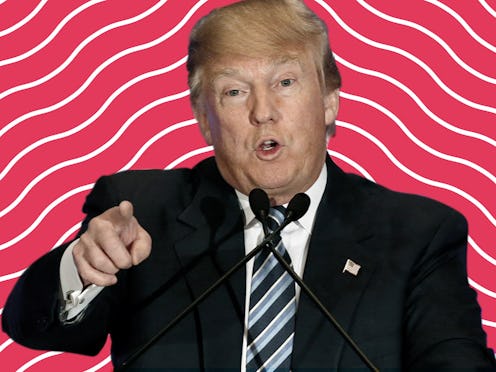News
It's Time To Stop Calling Trump Supporters This

One of the more baffling and horrifying features of Donald Trump's rise to power has been the tone of entitled, unflappable confidence drenching his every move — regardless of the numerous logical, factual, and moral gaps in his statements. It's easy, if you're already a critic of Trump, to read it as "stupidity" or "ignorance" and dismiss it as another character flaw among many. However, it might be something a bit more complex than that as seen in an analysis published by POLITICO on Trump and the Dunning-Kruger effect (by one of the study's original authors, David Dunning) that explores the ways that the infamous cognitive bias sheds light on Trump's fascinating-if-horrifying voter base and, ultimately, why we're all better off understanding the way they think:
People with severe gaps in knowledge and expertise typically fail to recognize how little they know and how badly they perform. To sum it up, the knowledge and intelligence that are required to be good at a task are often the same qualities needed to recognize that one is not good at that task—and if one lacks such knowledge and intelligence, one remains ignorant that one is not good at that task. This includes political judgment.
Essentially, it describes a phenomenon where individuals who are already ignorant of a subject are significantly more likely to be over-confident and oblivious to everything they don't know. Likewise, people who are better versed are more likely to underrate their skills and recognize the things they're less informed about. (Coincidentally, I had a teacher in high school who was obsessed with the Dunning-Kruger effect and considered it the perfect way to dismantle the inflamed egos of suburban AP composition students.)
At this point, it's a truth universally acknowledged that the internet is aggressively resistant to nuance. So it's super easy for the take-away of this analysis to get squished down to a digestible-if-reductive 140-character or less sentiment e.g. Trump voters are stupid and don't know how stupid they are. But, thankfully, Dunning isn't all broad strokes and hellfire. He acknowledges that the big, amorphous scourge of ignorance isn't necessarily born from willful, cartoonish stupidity (nor is it something that Trump supporters alone are guilty of). Instead, it's born of a perfect storm of misinformation, fear, anger, and partisanship:
In voters, lack of expertise would be lamentable but perhaps not so worrisome if people had some sense of how imperfect their civic knowledge is. If they did, they could repair it. But the Dunning-Kruger Effect suggests something different. It suggests that some voters, especially those facing significant distress in their life, might like some of what they hear from Trump, but they do not know enough to hold him accountable for the serious gaffes he makes. They fail to recognize those gaffes as missteps.
...Again, the key to the Dunning-Kruger Effect is not that unknowledgeable voters are uniformed; it is that they are often misinformed — their heads filled with false data, facts and theories that can lead to misguided conclusions held with tenacious confidence and extreme partisanship, perhaps some that make them nod in agreement with Trump at his rallies.
Dunning further explains that this phenomenon is common not just in politics but in "logical reasoning, grammar, emotional intelligence, financial literacy, numeracy, firearm care and safety, debate skill, and college coursework ... poor chess players, unskilled medical lab technicians, medical students unsuccessfully completing an obstetrics/gynecology rotation, and people failing a test on performing CPR."
TL;DR: People frequently think they know more than they actually do about all kinds of stuff. With Trump voters — and, arguably, the self-described "very smart man" himself — it just so happens that their gaps in knowledge are dealing with the high-stakes, yikes-worthy issues of the economy, social issues, and foreign policy. And their breed of confidence manifests in an extremely volatile way.
When we're dealing with highly partisan groups — frequently quoting their own stats (often more "truthy" than true) at one another — who are often determining that the other "smart" people are the ones who agree with their leanings and belong to their tribe, it feels more and more that the worst thing you can do is use a group's ignorance as a means of discounting them and their very real voting power.
As far as name-calling and insults go, there's no easier way to end a conversation than by agreeing that the individuals promoting blustery, "Make America Great Again" rhetoric are simply stupid and not worth your time. However, perhaps through understanding how these voters think, there's a way to approach ignorance, gaps in knowledge and vastly different lived-experiences in a more constructive way, without making the dangerous (maybe fatal for a campaign) mistake of outright dismissal.
Image: Dawn Foster/Bustle (1)